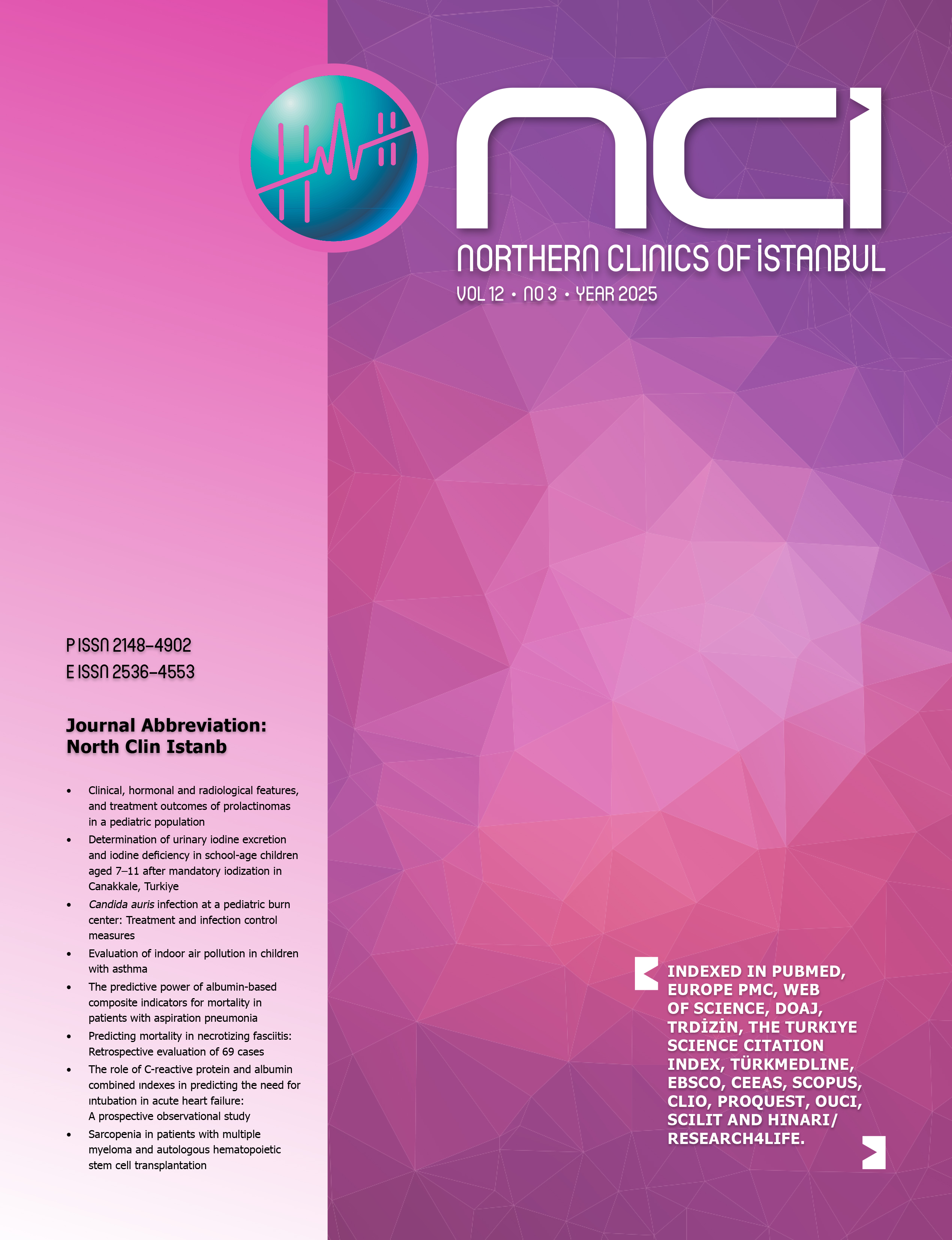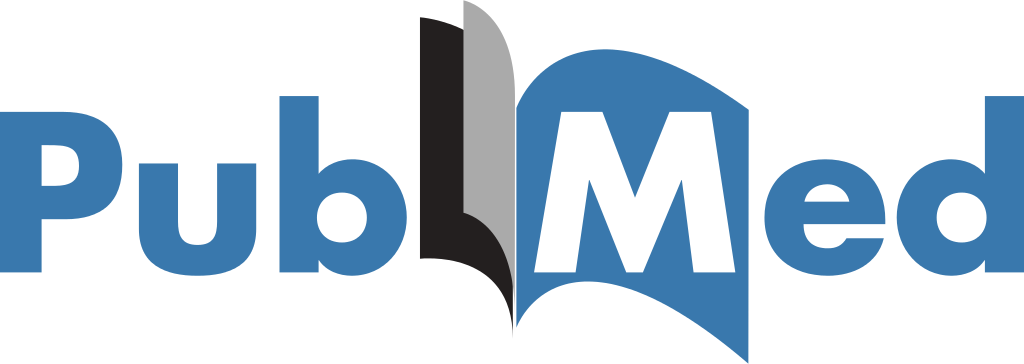Evaluation of the relationship between mast cell activation and postural orthostatic tachycardia syndrome in children and adolescents
Yunus Emre Bayrak1, Ozlem Kayabey2, Evic Zeynep Basar2, Isil Eser Simsek3, Metin Aydogan3, Abdulkadir Babaoglu21Department of Pediatrics, Kocaeli University Faculty of Medicine, Kocaeli, Turkiye2Department of Pediatric Cardiology, Kocaeli University Faculty of Medicine, Kocaeli, Turkiye
3Department of Pediatric Immunology and Allergy, Kocaeli University Faculty of Medicine, Kocaeli, Turkiye
OBJECTIVE: Postural orthostatic tachycardia syndrome (POTS) is one of the orthostatic intolerance syndromes that are common in young adolescents and impair quality of life. POTS is a multi-systemic disease. Many mechanisms have been defined in POTS etiology, such as autonomic denervation, hypovolemia, hyperadrenergic stimulation, low condition, and hypervigilance. Recently, mast cell activation (MCA) has also been on the agenda in etiology. There are few studies in the literature on the relationship between MCA and POTS in adulthood. However, data on children and adolescents is limited. In light of this information, we aimed to evaluate the relationship between POTS and MCA by measuring serum tryptase levels, a specific marker for MCA.
METHODS: This prospective study included patients who were admitted to Kocaeli University Faculty of Medicine Hospital Pediatric Cardiology outpatient clinic for syncope-presyncope between November 2018 and August 2019. Patients who underwent the TILT-table test were enrolled in the study. Patients with structural heart disease or chronic heart disease were not included in this study. Serum tryptase levels were obtained from all patients before the TILT-table test, and serum tryptase levels were re-studied after the test was terminated in patients with positive TILT-table tests for POTS. Patients diagnosed with POTS were classified as Group 1, and other patients were classified as Group 2.
RESULTS: Twenty-eight of the 58 patients included in the study (mean: 14.4±2.0 years; 38 girls, 20 boys) were diagnosed with POTS. The remaining 30 patients were diagnosed with vasovagal syncope and included in Group 2. The increase in mean heart rate during the test was 38±6 beats/min and 47.05%±15.65% in patients with POTS. Basal serum tryptase levels were not different between groups (3.2±1.3 ng/ml and 3.84±1.78 ng/ml, respectively; p=0.129), while serum tryptase levels (both baseline and after 4560 min of the TILT-table test) were higher in patients presenting with symptoms related to MCA compared to others.
CONCLUSION: In the literature, MCA was considered to be one of the mechanisms leading to POTS. Although other mechanisms, such as neuropathic and hypovolemic POTS, may be active in the patients, the symptoms of MCA in these patients should be routinely questioned.
Çocuk ve adölesanlarda mast hücre aktivasyonunun postüral ortostatik taşikardi sendromu ile ilişkisinin değerlendirilmesi
Yunus Emre Bayrak1, Ozlem Kayabey2, Evic Zeynep Basar2, Isil Eser Simsek3, Metin Aydogan3, Abdulkadir Babaoglu21Kocaeli Üniversitesi Tıp Fakültesi, Çocuk Sağlığı ve Hastalıkları Anabilim Dalı, Kocaeli2Kocaeli Üniversitesi Tıp Fakültesi, Pediatrik Kardiyoloji Anabilim Dalı, Kocaeli
3Kocaeli Üniversitesi Tıp Fakültesi, Pediatrik İmmünoloji ve Alerji Anabilim Dalı, Kocaeli
Giriş ve amaç: Postüral ortostatik taşikardi sendromu (POTS) ergenlerde sıklıkla görülen ortostatik intolerans sendromlarında biridir ve yaşam katiletesini etkiler. Multisistemik bir hastalıktır ve oluşumunda otonomik disfonksiyon, hipovolemi, hiperadrenerjik uyarı gibi bir çok mekanizma sorumlu tutulmaktadır. Mast hücresi aktivasyonu (MHA) oluşum mekanizmlarından biri olarak suçlanmaktadır. Literatürde MHA ve POTS ilişkisi üzerine erişkin dönemde yapılmış az sayıda çalışma bulunmaktadır. Çocuk ve adolesanlarda ise bu konu ile ilgili veriler sınırlıdır. Bu bilgiler ışığında kliniğimizde POTS tanısı alan hastalarda semptomatoloji yanında MHA için spesifik belirteç olan serum triptaz düzeyleri ölçülerek POTS-mast hücre aktivasyonu ilişkinin değerlendirilmesi amaçlanmıştır.
Yöntem: Bu prospektif çalışmaya Kasım 2018 - Ağustos 2019 tarihleri arasında kliniğimizde senkop-presenkop nedeniyle başvuran ve eğik masa testi yapılan hastalar dahil edilmiştir. Yapısal kalp hastalığı ya da kronik hastalığa sahip olan hastalar çalışma kapsamına alınmamıştır. Eğik masa testi öncesinde tüm hastalardan serum triptaz düzeyi gönderilmiş ve ayrıca POTS tanısı alan hastalardan test sonrası da serum triptaz düzeyleri çalışılmıştır. POTS tanısı alan hastalar grup 1, diğer hastalar ise grup 2 olarak sınıflandırılmıştır.
Sonuçlar: Çalışmaya dahil edilen 58 hastadan (ortalama: 14.4±2.0 yıl; 38 kız, 20 erkek) 28i POTS tanısı aldı. Geriye kalan 30 hasta vazovagal senkop tanısı aldı ve grup 2ye dahil edildi. POTS tanısı alan hastaların test sırasında kalp hızı artışı ortalama 38±6 atım/dk, artış oranı ise %47,05±15,65 olarak bulundu. Bazal serum triptaz düzeyleri açısından POTS grubu ve kontrol grubu arasında farklı bulunmadı (sırasıyla; 3,2±1,3 ng/ml ve 3,84±1,78 ng/ml; p=0,129). Ancak serum triptaz düzeyleri MHA bulguları olan hastalarda daha yüksekti.
Tartışma: Postüral ortostatik taşikardi sendromuna yol açacak mekanizmalardan biri de MHAdır. POTS hastalarında mast hücre aktivasyonuna ait semptomlar rutin sorgulanmalıdır. (NCI-2023-6-8)
Manuscript Language: English





















